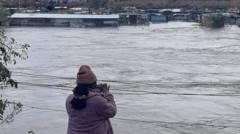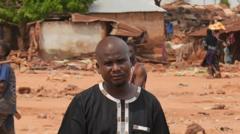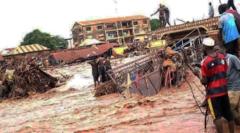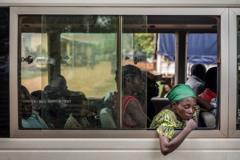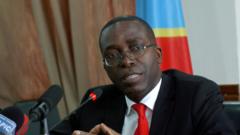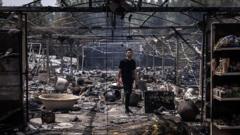Kinshasa, a city of 17 million, is reeling from severe flooding after torrential rains, with many residents struggling to escape the rising waters. The government faces criticism for a perceived lack of timely assistance as infrastructure crumbles under the weight of climate change effects.
Catastrophic Flooding Claims Lives in Kinshasa Amid Climate Crisis

Catastrophic Flooding Claims Lives in Kinshasa Amid Climate Crisis
Over 33 have died in Kinshasa following intense rains that overwhelmed the Congolese capital, sparking urgent calls for better disaster response.
In a devastating turn of events, Kinshasa, the capital city of the Democratic Republic of Congo, is grappling with catastrophic flooding, which has so far claimed at least 33 lives. The heavy rains have left the 17 million residents of the city struggling to flee deluged neighborhoods, resorting to makeshift canoes and swimming to seek safety.
The Congo River, one of the largest rivers in the world, has recently surged to its highest levels in 60 years, exacerbated by climate change that has intensified flooding in the region. Parts of Kinshasa are particularly vulnerable due to soil erosion, with local residents reporting significant destruction to homes and infrastructure.
According to the city’s mayor, approximately half of Kinshasa's 26 districts are affected, with the worst damages noted in the outskirts and impoverished areas. Many families are still trapped inside their homes, as water levels have risen to dangerous heights—up to 1.5 meters in some locales, leaving residents like Christophe Bola in dire situations.
Frustration is growing among the population, many of whom claim that governmental response has been inadequate and delayed. The flooding has also disrupted water supply, as local treatment facilities have been submerged, adding to the residents' distress.
Key transport routes are now impassable, further complicating rescue efforts and the flow of aid. The N'djili River, a tributary of the Congo, has burst its banks, further increasing the peril facing the local communities, known for their inadequate sewage systems and poor urban planning.
In the coming days, meteorologists predict continued heavy rainfall in different parts of the DR Congo, raising concerns that the humanitarian crisis will worsen if immediate measures are not taken. The ongoing situation underscores the urgent need for effective government intervention and long-term solutions to address the challenges posed by climate change and urban preparedness.


